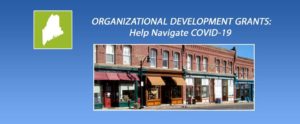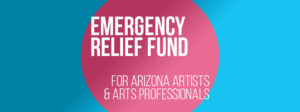April 7, 2020
Maine, Arizona, Colorado: COVID-19 Grant Adaptations
State arts agencies are making rapid changes to their grant programs to help the arts field adjust to unforeseen circumstances stemming from COVID-19. These tactics include accelerating grant payments, extending deadlines, waiving matching requirements, converting project awards to operating support, and revising budget parameters to allow more flexibility in how award dollars are used. Some state arts agencies—including Maine, Arizona and Colorado—also are developing new programs dedicated to COVID-19 aid.
Maine Artist Relief Fund
The Maine Arts Commission is deploying several grant-making strategies to help Maine artists and arts organizations tap much-needed assistance. A new Maine Artist Relief Fund awards funds to individual artists whose incomes are being adversely impacted by the coronavirus pandemic. With so many performances, residencies and exhibits being canceled, creatives who rely on these events for their livelihoods are rapidly losing income. The Maine Artist Relief Fund allows artists who are permanent residents of Maine to apply for $500 in aid that may be used to offset losses or recoup out-of-pocket costs for canceled events. Lower-income artists will receive priority funding consideration. This short-term program opened for applications on April 1 and closes June 30, 2020. The agency also has established a mechanism for donors to supplement the funds available for these relief grants through ArtsEngageME, a nonprofit advocacy and support organization for the Commission.
The Arts Commission also is maximizing the use of its existing grant categories to address COVID-19 needs. Organizations that ordinarily would apply for project based support are being urged to consider applying for Organizational Development Grants. Traditionally designed to address capacity issues like strategic planning or board development, this grant category is flexible enough to assist arts organizations with adapting their management strategies to address programming, financial and operational challenges arising from COVID-19. Likewise, the Commission’s Project Grants for Artists are being positioned not only to fund the creation of new work but also to support activities that help independent artists adapt to COVID-19. Eligible activities include e-commerce platform development, online instructional design, software subscriptions and the creation of digital marketing plans. For more information on Maine’s grant adaptation strategies, contact Maine Arts Commission Executive Director Julie Richard.
Arizona: Emergency Relief Fund
In a cross-sector partnership to provide a coordinated response to the COVID-19 pandemic, Arizona arts funders and service organizations have developed a collaborative strategy to provide emergency aid to artists and arts professionals. The Arizona Commission on the Arts (ACA) recently announced the launch of an Emergency Relief Fund for Arizona Artists and Arts Professionals. The new grant program is open to residents of Arizona whose primary source of income is related to artistic production, teaching artist residencies, cultural events or contract work with nonprofit arts organizations. Grants of $500-$1,500 will be available to applicants who are experiencing canceled events or terminated contracts due to the coronavirus. The application process emphasizes simplicity: “The Emergency Relief Fund is unlike some other grant programs where individuals are asked to ‘make the best case’ for funding. Please do not feel you have to persuade. The simpler, the better.”
This relief effort is made possible by multiple contributors. The Arizona Community Foundation is the initial lead investor and the application process will be managed by ACA. Other partners include Artlink Inc., the Arts Foundation for Tucson and Southern Arizona, and the City of Phoenix Office of Arts and Culture. Other individuals and organizations are invited to contribute to the fund.
Demographic and geographic reach will be important considerations in the distribution of funds. Mindful of the digital divide affecting lower-income and rural artists, ACA is promoting open hot-spots and other services for increased Internet accessibility to make it easier for artists to apply online. The partners also are working with diverse networks and community leaders to spread the word about this relief opportunity. For further information, contact ACA Communications Director Steve Wilcox.
Colorado: COVID-19 CO Creatives Relief Grants

Durango Creative District mural by artists Hayley Kirkman, Matthew French-Holt and Lexis Loeb. Photo credit: Local First La Plata
Colorado Creative Industries (CCI) recognized that COVID-19 presents intense challenges for arts programs—from venue closures to canceled programming and missed fundraisers—all of which are disrupting revenue streams for the creative sector. In response, CCI rapidly launched the COVID-19 CO Creatives Relief Grant program. This grant initiative offers one-time payments to nonprofit arts organizations in Colorado with an annual operating budget of less than $1 million. All grants are for general operating support, to allow grantees to address immediate operational needs such as payroll, rent, utilities and reconceiving programs.
Funding priority will be given to small and midsize organizations—especially those working in underserved communities, who historically have limited access to donors and working capital. To further ensure the maximum spread of funds among organizations in need, the guidelines stipulate that the new relief grants may not be distributed to organizations already receiving CCI support in the past year. CCI is working with current grantees to flexibly adjust existing grant parameters to address unforeseen COVID-19 needs.
Award amounts will range from $4,000 to $8,500, based on the organization’s cash operating revenue for the most recently completed fiscal year. This is a fast-turnaround opportunity: applications are due in May 2020 and all grant funds must be expended before the end of December. To find out more about the program, contact CCI Online Systems & Grant Administrator Sami Wells.
CCI also is a partner in the statewide Colorado Relief Fund, designed to assist artists whose earnings have been impacted by the coronavirus. The fund pools private and public resources to help the arts field respond to the pandemic and is being be administered through RedLine. Current partners in this developing initiative include Denver Arts & Venues, the Andy Warhol Foundation for the Visual Arts and CCI. Awards of up to $1,000 offset artist losses and can be used to cover basic expenses such as food, rent, medical costs and child care.
In this Issue
From the President and CEO
State to State
- Massachusetts, Delaware, Rhode Island: Sustaining Public Engagement during COVID-19
- Kentucky, Maryland, North Carolina: Virtual Marketplaces and COVID-19
- Utah, California: COVID-19 State Impact Research
- Maine, Arizona, Colorado: COVID-19 Grant Adaptations
Legislative Update
The Research Digest
Announcements and Resources
More Notes from NASAA
SubscribeSubscribe
×
To receive information regarding updates to our newslettter. Please fill out the form below.



